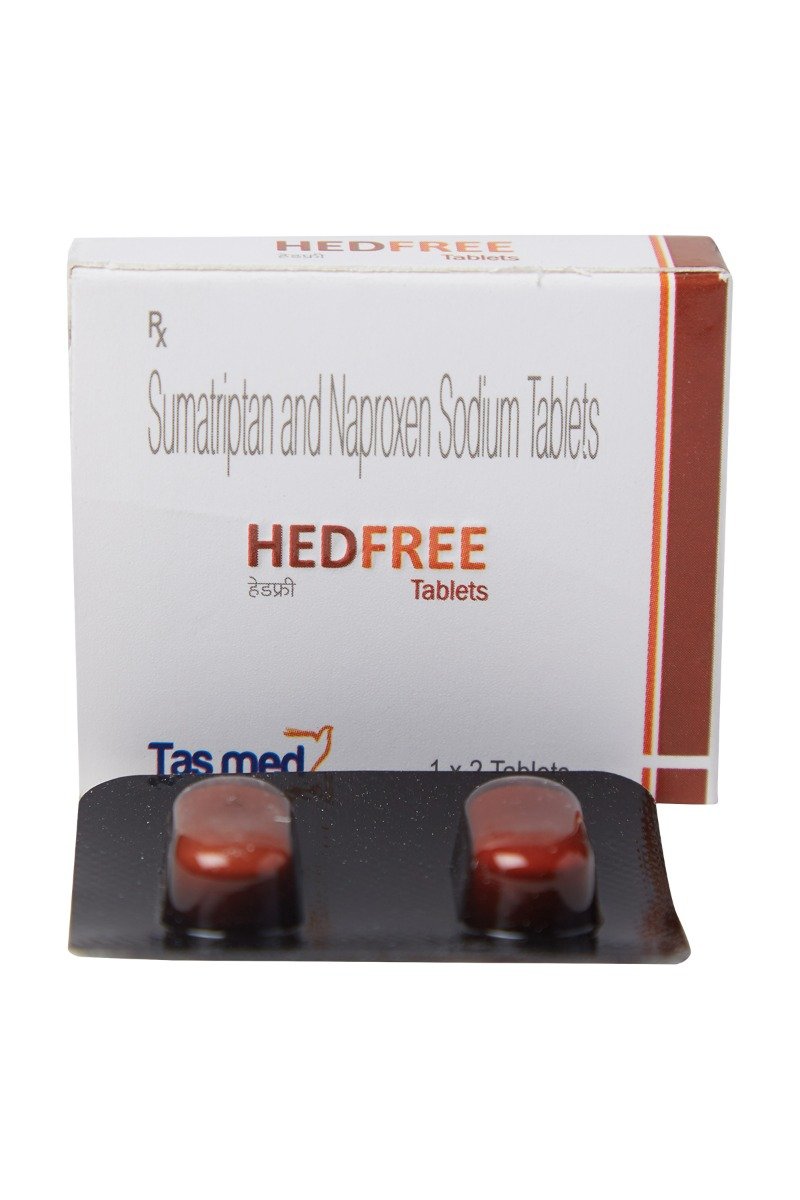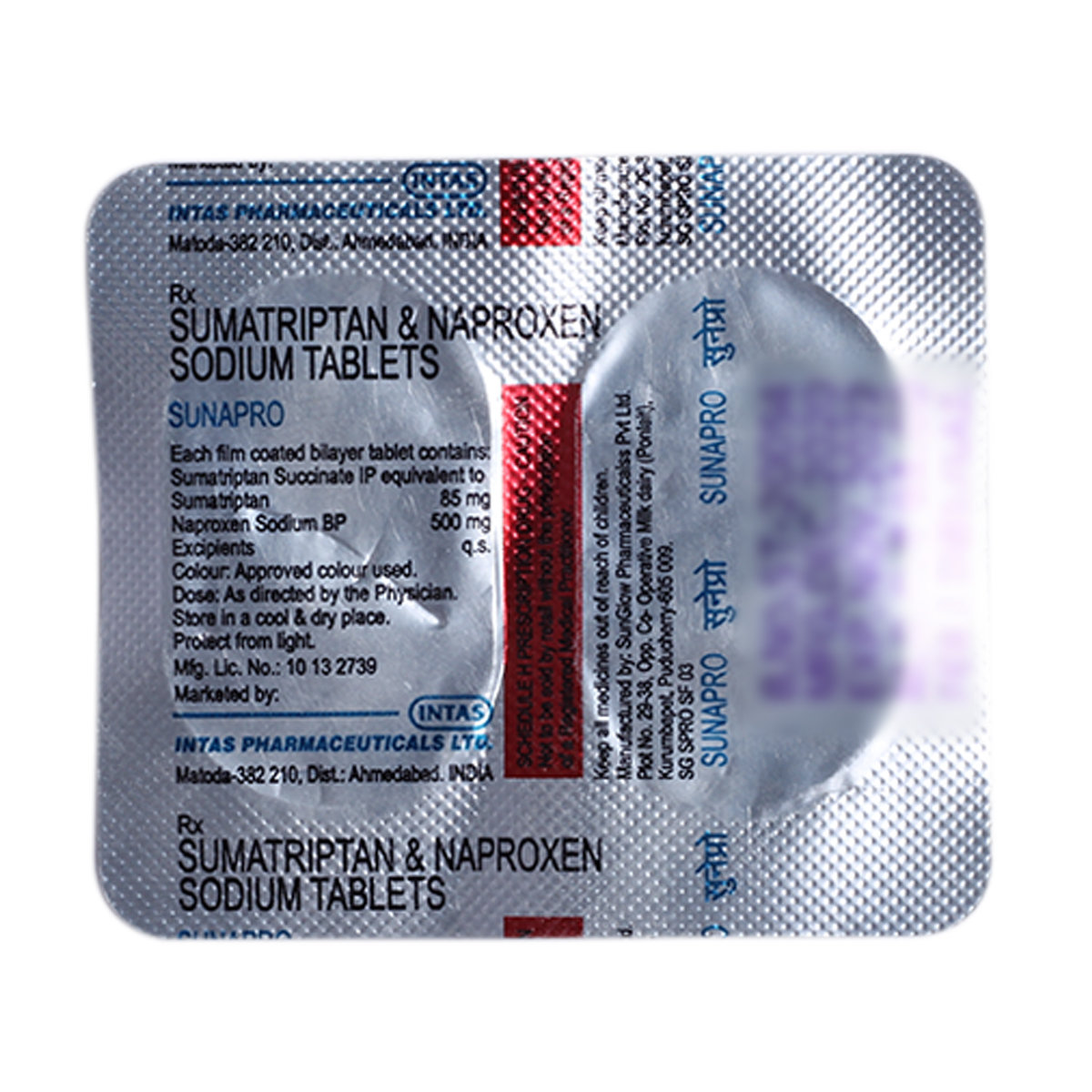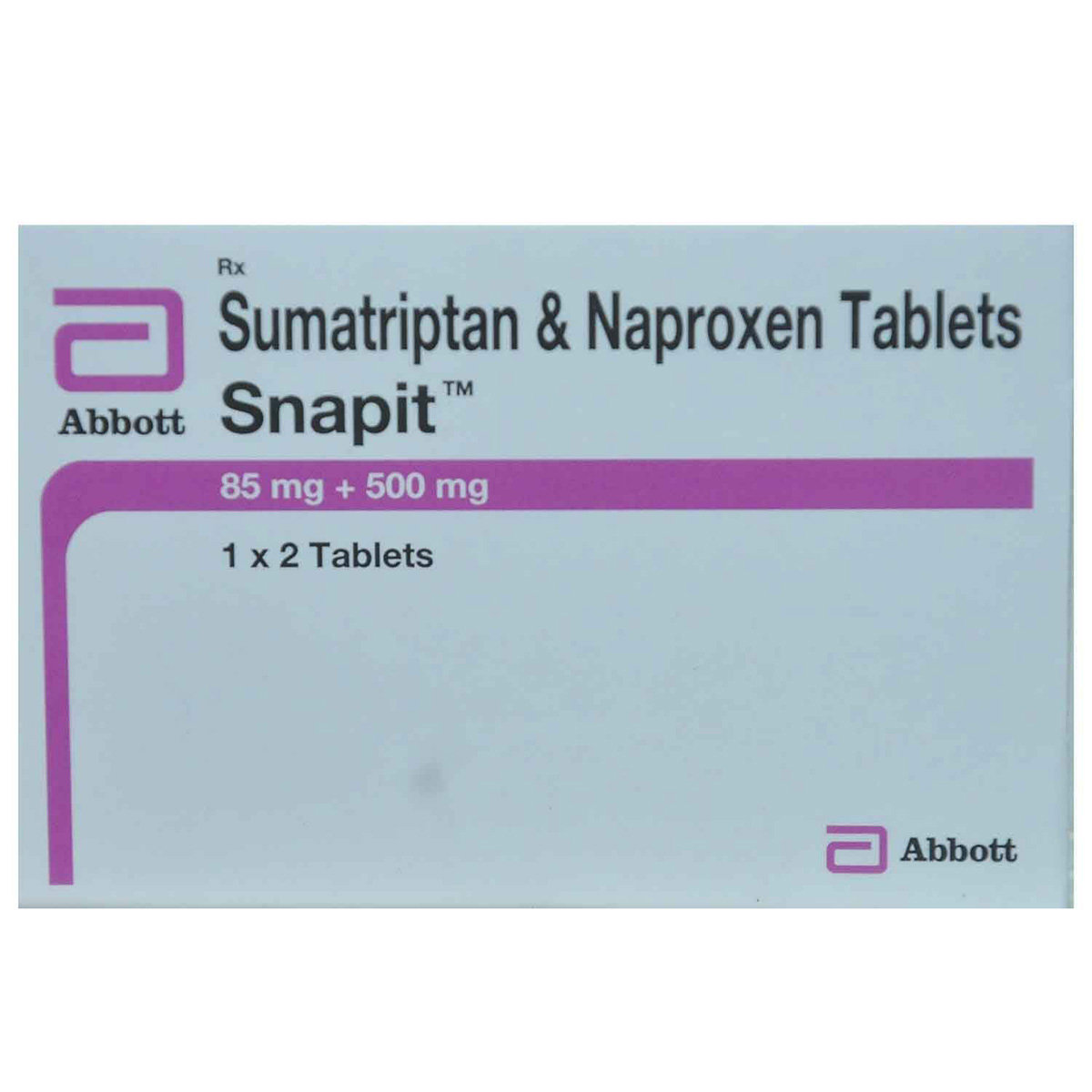Naprosuma Tablet 2's
MRP ₹86
(Inclusive of all Taxes)
₹12.9 Cashback (15%)
Provide Delivery Location
Online payment accepted
 Prescription drug
Prescription drugWhats That
Composition :
Manufacturer/Marketer :
Consume Type :
Expires on or after :
Return Policy :
About Naprosuma Tablet
Naprosuma Tablet belongs to the class of medicines called 'antimigraine agents' used to prevent migraine symptoms such as headache, nausea, and vomiting. Migraine is a neurological condition which is characterised by an intense pulsating, throbbing, pounding, debilitating headache which usually occurs on one side of the head; however, it can occur on both sides or shift. Hormonal changes, stress, bright lights, loud sounds, certain foods and drinks can trigger migraine headaches.
Naprosuma Tablet is a combination of two drugs, namely: Sumatriptan and Naproxen. Sumatriptan acts on the serotonin (5-HT) receptors located in the brain, thereby causing the narrowing of the brain's blood vessels, which in turn affects the blood flow patterns associated with headache. Naproxen is a painkiller which works by blocking the effect of chemical messengers that cause pain. Thus, Naprosuma Tablet prevents symptoms of migraine-like headache, nausea and vomiting.
You are advised to take Naprosuma Tablet for as long as your doctor has prescribed it for you depending on your medical condition. In some cases, you may experience certain common side-effects such as dizziness, sleepiness, nausea, chest discomfort, dry mouth, irregular heartbeats, and heartburn. Most of these side-effects do not require medical attention and will resolve gradually over time. However, you are advised to talk to your doctor if you experience these side-effects persistently.
Consult your doctor if you are pregnant or breastfeeding. Naprosuma Tablet should not be taken during the third trimester of pregnancy. Naprosuma Tablet may cause drowsiness and dizziness, so drive with caution. Naprosuma Tablet should not be given to children as safety and efficacy have not been established. Avoid consuming alcohol with Naprosuma Tablet as it could lead to increased drowsiness and dizziness. Keep your doctor informed about your health condition and medicines to rule out any side-effects.
Uses of Naprosuma Tablet
Directions for Use
Key Benefits
Naprosuma Tablet is a combination of two drugs, namely: Sumatriptan and Naproxen. Naprosuma Tablet is indicated for the acute treatment of migraine with or without aura. Sumatriptan is a serotonin receptor agonist that acts on the serotonin (5-HT) receptors located in the brain, which causes the narrowing of the brain's blood vessels, thereby affecting the blood flow patterns with a headache. Naproxen is a pain killer which works by blocking the effect of a chemical messenger known as cyclo-oxygenase (COX) enzymes that make other chemical prostaglandins. By blocking the effect of COX enzymes, lesser prostaglandins are produced, thereby reducing pain in migraine.
Storage
Drug Warnings
Do not take Naprosuma Tablet if you are allergic to any of its contents; if you have had any recent heart surgery or stroke, blood circulation problems, heart problems, narrowing of blood vessels to the stomach, legs, arms or kidneys, or uncontrolled high blood pressure; if you are taking MAO inhibitors, antidepressant or have taken them in the last 14 days; or if you have taken 5-HT agonists called triptan or ergotamine in the last 24 hours. Inform your doctor if you have high blood pressure, asthma, diabetes, epilepsy, overweight, heart, kidney or liver problems. Consult your doctor if you are pregnant or breastfeeding. Naprosuma Tablet should not be taken during the third trimester of pregnancy. Naprosuma Tablet may cause drowsiness and dizziness, so drive only if you are alert. Naprosuma Tablet should not be given to children as safety and effectiveness have not been established. Avoid consuming alcohol with Naprosuma Tablet as it could lead to increased drowsiness. Stop taking Naprosuma Tablet and consult your doctor immediately if you have stomach pain or any signs of bleeding in the intestine or stomach, such as blood in stools.
Diet & Lifestyle Advise
- Maintain a healthy diet and exercise regularly as it helps in improving overall health and boosts self-esteem.
- Avoid bright lights, loud noise, and extreme temperatures.
- Perform meditation and yoga. This helps in relieving stress and provides relaxation.
- Follow a regular sleep pattern to improve the amount and quality of sleep you get.
- Massage your scalp to ease the pain.
- Lie down in a quiet, dark room.
- Place a cold cloth over your forehead or neck.
- Avoid smoking, alcohol, and caffeinated drinks.
- Learn what triggers your migraine and try avoiding them.
- Stay hydrated. Drink plenty of fluids.
- Learn relaxation skills as they help in reducing stress.
Side Effects of Naprosuma Tablet
- Dizziness
- Sleepiness
- Nausea
- Chest discomfort
- Dry mouth
- Irregular heartbeats
- Heartburn
Habit Forming
Therapeutic Class
All Substitutes & Brand Comparisons
RX
Out of StockNapcet Tablet
₹137
(₹41.1 per unit)
6% COSTLIERRX
Sumalgia Tablet 4's
Lyceum Life Sciences Pvt Ltd
₹187
(₹42.08 per unit)
8% COSTLIERRX
Out of StockFyn-Head Tablet
Gonan Pharma
₹189
(₹42.53 per unit)
9% COSTLIER
Author Details
We provide you with authentic, trustworthy and relevant information
FAQs
Drug-Drug Interactions Checker List
- WARFARIN
- ASPIRIN
- LITHIUM
- METHOTREXATE
- DIGOXIN
- CITALOPRAM
- DULOXETINE
- FLUOXETINE
- DESVENLAFAXINE
- METOPROLOL
- OMEPRAZOLE
Disease/Condition Glossary
Migraine: Migraine is a neurological condition which is characterised by an intense, debilitating headache. Hormonal changes, stress, lack or excess of sleep, bright lights, loud sounds, certain foods and drinks can trigger migraine headaches. Warning symptoms precede migraine headache one or two days before the headache itself. The warning symptoms include food cravings, depression, fatigue, hyperactivity, irritability, and neck stiffness. Symptoms of migraine include throbbing pain in one particular area with varying intensity, nausea, vomiting, numbness or tingling sensation, difficulty speaking, sensitivity to sound and light.

Have a query?
Alcohol
Safe if prescribed
Avoid consumption of alcohol while taking Naprosuma Tablet as it may cause increased drowsiness.
Pregnancy
Consult your doctor
Naprosuma Tablet should be used during the first and second trimesters of pregnancy only if the benefits outweigh the risks. Naprosuma Tablet should not be taken during the third trimester of pregnancy.
Breast Feeding
Consult your doctor
Naprosuma Tablet may pass into breastmilk and harm the baby. Please consult your doctor before taking Naprosuma Tablet; your doctor will decide whether Naprosuma Tablet can be taken by breastfeeding mothers or not.
Driving
Safe if prescribed
Naprosuma Tablet may cause dizziness, weakness and drowsiness. Do not drive or operate machinery unless you are alert.
Liver
Consult your doctor
Dose adjustment may be needed in patients with liver impairment. Please consult your doctor if you have a liver impairment or any concerns regarding this.
Kidney
Consult your doctor
Dose adjustment may be needed in patients with kidney impairment. Please consult your doctor if you have kidney impairment or any concerns regarding this.
Children
Safe if prescribed
Naprosuma Tablet should not be given to children as the safety and effectiveness were not established.











_0.jpg?tr=q-85)

